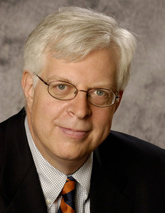
by Dennis Prager –
In his front-page-of-the-business-section “Economic Scene” column in The New York Times last week, Eduardo Porter wrote, “The United States does less than other rich countries to transfer income from the affluent to the less fortunate.”
Think about that sentence for a moment. It ends oddly. Logic dictates that it should have said, “transfer income from the affluent to the less affluent,” not the less fortunate.
But for Porter, as for the left generally, those who are not affluent are not merely “less affluent,” they are “less fortunate.”
Why is this? Why is the leftist division almost always between the “affluent” and the “less fortunate” or between the “more fortunate” and the “less fortunate”?
To understand the left, one must understand that in its view the greatest evil is material inequality. The left is more troubled by economic inequality than by evil, as humanity has generally understood the term. The leftist divides the world not between good and evil but rich and poor.
The left is more troubled by economic inequality than by evil
Because inequality is the chief moral concern of the left, the words “less affluent” or even “poorer” do not meet the left’s moral needs. It needs to believe, and to have others believe, that what separates economic classes is not merely how much material wealth members of each class have. Rather, it is the amount of good and bad luck — “fortune,” as the left puts it — that each class has.
This is how the left justifies high taxes. Isn’t it only fair and moral that as much money as possible be taken from the lucky and given to the unlucky? After all, the affluent didn’t achieve affluence through harder work, but through greater luck.
To acknowledge that most of America’s affluent (meaning those who earn over $200,000) have attained their affluence through hard work is to undermine the fairness issue at the core of the left’s understanding of economic inequality and justification for confiscatory taxes.
For the left, affluence is won, not earned.
For the left, affluence is won, not earned. Indeed, English is one of the few languages that even has or uses the word “earn” in regard to income. In Romance languages such as French, the verb meaning to earn is “gagner,” which means “to win.” In terms of language, in America, people earn their wealth, while in most of Europe and Latin America, people win it.
The fact is that, except for those very few whose wealth is overwhelmingly or entirely inherited, the more affluent have usually worked harder than the less affluent. While, of course, there are hardworking poor people just as there are Wall Street CEOs who do not deserve their “golden parachutes,” in America, differences in income exist largely because of the values and the hard work of those who make more money.
In this regard, The Washington Post reported the findings of Harvard professor Daniel Kahneman, winner of the 2002 Nobel Prize in economics:
“People who make less than $20,000 a year … told Kahneman and his colleagues that they spend more than a third of their time in passive leisure — watching television, for example. Those making more than $100,000 spent less than one-fifth of their time in this way — putting their legs up and relaxing. Rich people spent much more time commuting and engaging in activities that were required as opposed to optional.”
But for the left, it’s all about “fortune.”
leftists believe that the greatest evil is material inequality.
Every poll about the left, the right and happiness reveals that the further left one goes, the less happy the person is likely to be. This is one of the reasons: If you really believe that people wealthier than you are just luckier than you, how can you not be angry, resentful and unhappy?
On the other hand, there are tens of millions of conservatives who make much less money than others — yet feed their families, own a house and a car, have decent children, derive great meaning from their religion and live in the freest country in the world — who never call themselves “less fortunate.” They call themselves fortunate.
HT: DennisPrager.com

